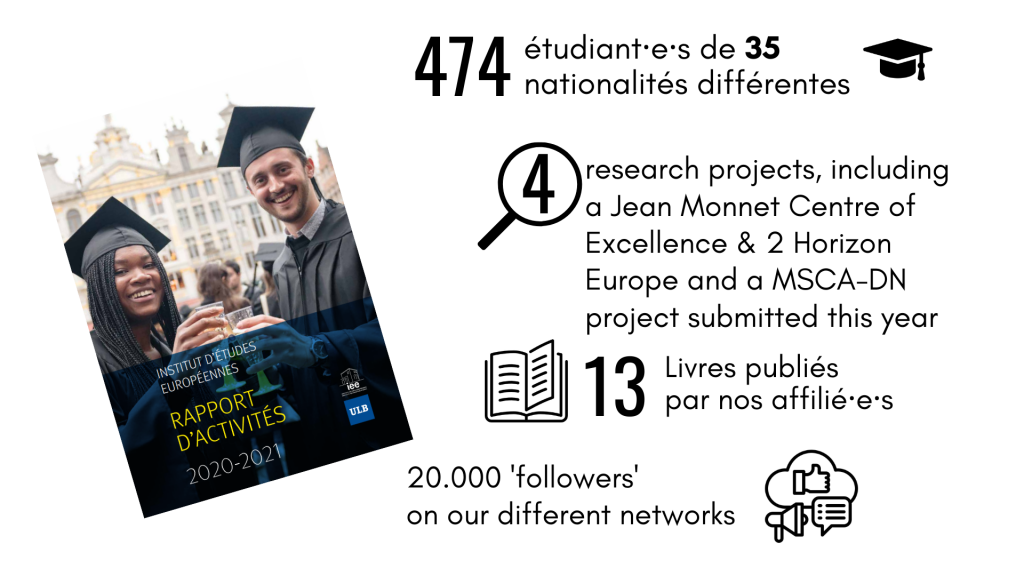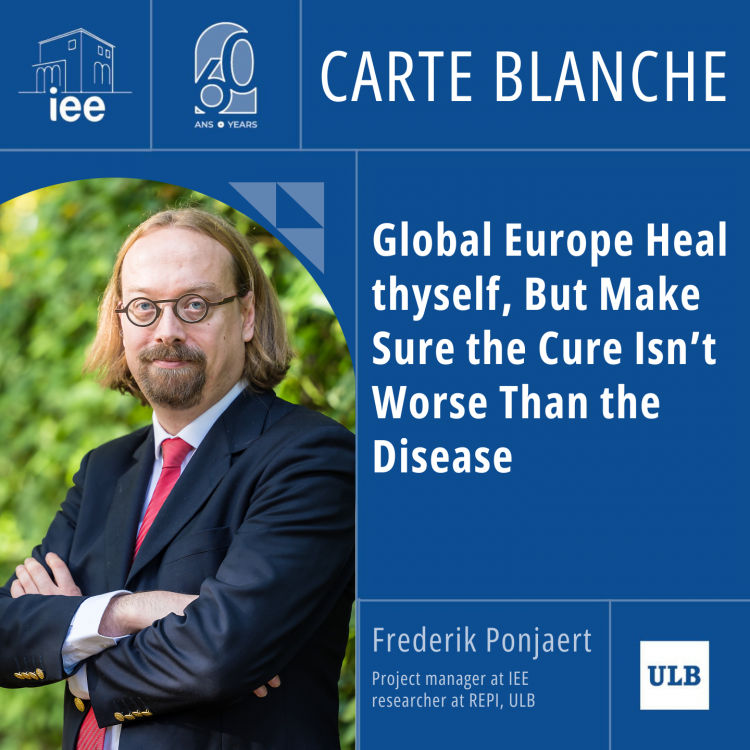Craving for (more) Europe
The 2020-2021 academic year was, once again, marked by the coronavirus pandemic and by the hopes and questions linked to the vaccination campaign and the actions of the European Union. The closure of borders, the restriction imposed on freedom of movement and the heterogeneity of national health policies paradoxically revealed a certain state of the European Union. The renewed pleasure of freely traveling accross the Schengen area was confronted with the diversity of local or national regulations, all as the map of Europe was coloured in shades of green, orange and red.
During lockdown, our desire for (more) Europe intensified, perhaps more than ever.
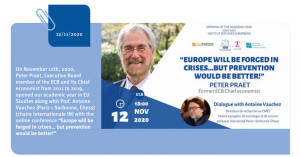
In this troubled context, the Institute for European Studies continued its activities, somewhat altered by the lockdows. The issue of crisis management was the theme of the opening of the IEE’s academic year on 12 November, 2020. Peter Praet, former Chief Economist of the ECB, and Antoine Vauchez, Director of Research at the CNRS (Visiting Professor at the IEE from September to October 2020) discussed the image of a European Union shaped by crises, but highlighted the need to anticipate them. This was also the message of the President of the European Commission, Ursula von der Leyden, in her State of the Union address in September 2021.
In addition to the management of the health crisis and the distribution of vaccines within and outside the EU, this academic year was an opportunity for exchanges and reflections on the situation in Belarus, the election of Joe Biden to the presidency of the United States, the increase in tensions in Northern Ireland and the SNP victory in Scotland foreshadowing a potential independence referendum. The issue of the rule of law and respect for values and rights in the European Union remained a major concern.
Other socio-economic questions that have been running through the EU at least since 2008, if not before, completed the picture. The Next Generation Europe recovery plan, which is gradually being implemented, is called upon to get the European economy back on track while at the same time embarking on the path of greening the economy. After much procrastination on the coordination of health policies and rules at European level, the introduction of a European certificate has contributed to a certain consistency at the EU level. The calls for solidarity that were so numerous at the beginning of the pandemic seemed have gradually eroded, and fears of tensions between citizens, sectors, regions and countries resurfaced. Perhaps the greatest challenge for the EU will not be so much to overcome the pandemic as to maintain social peace in the years to come. Will the EU be that space of solidarity? This is one of the questions guiding the IEE’s research and activities in 2020-2021 and in the years to come.
A renewed vision for research at the IEE
On the research front, the IEE started the academic year with a Research Committee meeting in September 2020. This was an opportunity for the affiliated members to reflect on our interdisciplinary and collective research agenda. It is in this framework that several research projects took shape, submitted in the framework of the Horizon Europe call. The preparation of a Jean Monnet Centre of Excellence project on the subject of inequalities in the EU is a good illustration of the very fruitful exchanges within the Research Committee, that also met in March 2021. The project reflects this interest and builds on the previous research activities of the IEE and its collaborators. The setting up of the ‘Interdisciplinary European Advanced Studies (IDEAS)’ conference in spring 2022 resonates with this issue, as it will revolve around the theme “(Dis)Integration from an (in)equality perspective”. However, the launch of the Concerted Research Action (CRA) on social rights in Europe has been postponed to the beginning of the next academic year.
Among our exchanges, the visit of Prof. Chris Bickerton, in the framework of the Project “Conflicts of Sovereignty in the EU”, financed by the 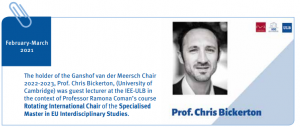 Wiener Anspach Foundation, consolidated an already well established scientific collaboration with several colleagues and contributed to the training of students on the multiple transformations of Europe since 1989. These exchanges with the universities of Oxford and Cambridge contribute to the IEE’s multiple interactions with partner universities. Thus, the academic year 2020-2021 constitutes an important moment in the emergence of the CIVIS network in which the IEE has been very involved in the perspective of new European universities.
Wiener Anspach Foundation, consolidated an already well established scientific collaboration with several colleagues and contributed to the training of students on the multiple transformations of Europe since 1989. These exchanges with the universities of Oxford and Cambridge contribute to the IEE’s multiple interactions with partner universities. Thus, the academic year 2020-2021 constitutes an important moment in the emergence of the CIVIS network in which the IEE has been very involved in the perspective of new European universities.
Supporting our students in a still troubled context
At the end of the academic year 2020-2021, the first steps were taken towards a closer relationship with the College of Europe in Bruges, and the collaboration will intensify the following year; IEE students welcome this rapprochement with enthusiasm.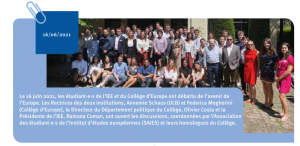
For the students, the past year was particularly frustrating. There were 474 students from 35 nationalities studying European Studies at the IEE and the three partner faculties. Unfortunately, the context of the pandemic meant that the programme was probably not very satisfying in terms of networking, discovering the European institutions and even in terms of pedagogical experiences. Nevertheless, the IEE tried to maintain a close relationship with its students as much as possible through its authorities and staff, in close collaboration with the partner faculties. After a long period of lockdown, it was a pleasure for students, academic and administrative staff to meet again in the IEE premises and gardens. Picnics were organised whenever sanitary conditions allowed for it, to re-establish social contacts partly hurt by the lockdowns.
To help maintain an active community life, the Institute financially supported the Specque delegation, which included several of its students, to participate in the simulation on the practice of democracy and decision-making. The IEE has maintained its collaborations with its two student associations: Eyes on Europe and SAIES, an integral part of the Institute’s functioning. These two associations make a fundamental contribution to the social activities for European Studies students in a sometimes difficult context.
We are thankful
We would also like to express our gratitude to all those who have worked closely with us during this challenging year, whether they belong to the academic, scientific or administrative staff. In particular, we would like to thank all our scientific and administrative staff, who have once again shown solidarity and dedication in these difficult circumstances.
Finally, we would like to take this opportunity to thank the authorities of our University who have continued to support the IEE and with whom we hope to consolidate the foundations of the Institute and thus participate in the influence of our University in Belgium and in Europe.
Thank you all for your collaboration, your work and your enthusiasm.
Ramona Coman, Emmanuelle Bribosia and Nicolas Verschueren
1st December 2021
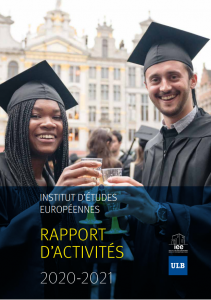 Read the annual report of the Institut d’études européennes of the ULB,
Read the annual report of the Institut d’études européennes of the ULB,
for the academic year 2020-2021
